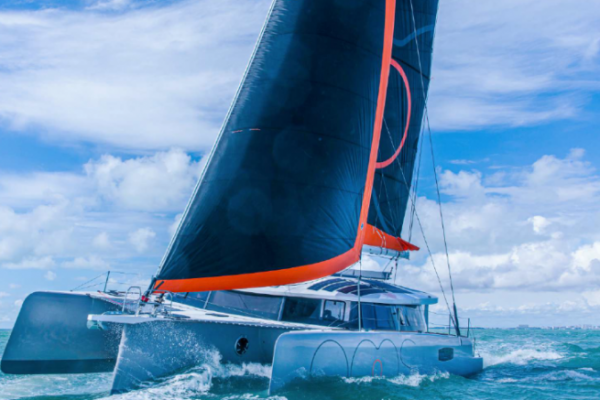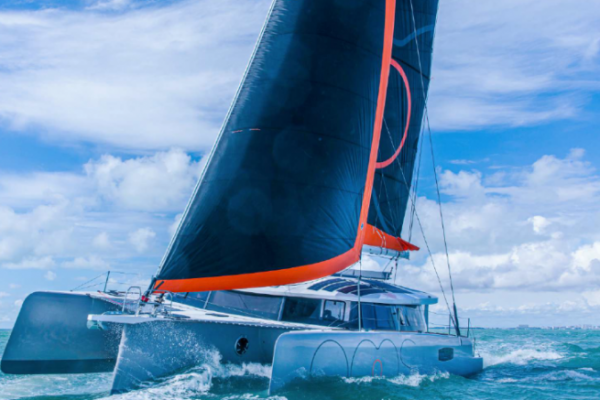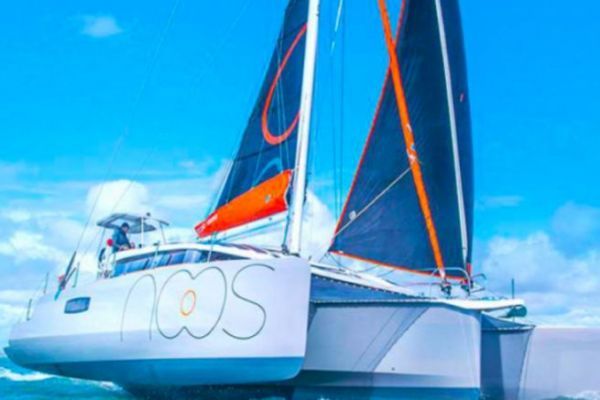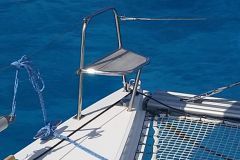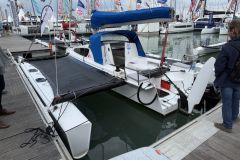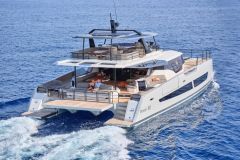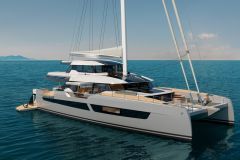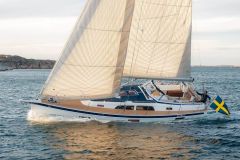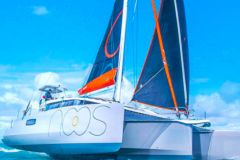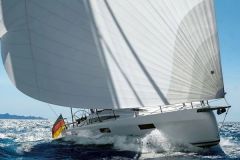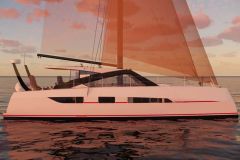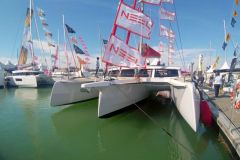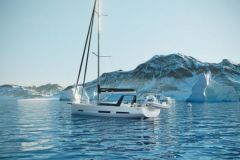Designing a trimaran capable of sailing in total autonomy for ocean cruises, while integrating the best environmental practices? This is the challenge taken up by the Noos project, which we tackle in this first part. With the Neel 51, a model that combines low-tech solutions with cutting-edge technologies, while guaranteeing safety and comfort for passengers, Wolf Boss inaugurates the Noos program Permaboat an initiative to create an autonomous sailboat capable of sailing the oceans responsibly. On October 3, 2024, at the Association Française du Bateau Électrique (AFBE) awards ceremony, the Noos trimaran won over the public with its commitment to decarbonizing maritime transport.
An eco-responsible philosophy
The Noos project stands out in the nautical landscape of pleasure trimarans. Based on the Neel 51, a model developed by the naval architecture firm Joubert-Nivelt Design, Noos has been modified to operate autonomously without the use of fossil fuels.
Wolf Boss, passionate about organic farming and sustainable innovation, brought this project to life after a radical turning point in his life. He wanted to demonstrate that it is possible to explore the world, even in remote areas, relying solely on available natural resources. To achieve this goal, he designed a fully autonomous trimaran capable of generating its own energy, managing its water supply and feeding its crew through biomass systems, while maintaining optimal nautical performance.
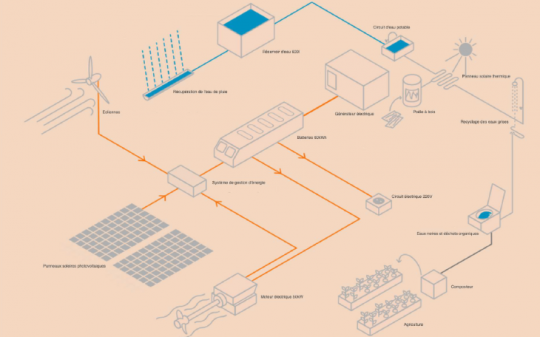
The Noos trimaran is distinguished by its combination of advanced technologies and simple low-tech solutions that reduce dependence on energy-hungry systems. This design enables the boat to operate efficiently, even in resource-constrained environments. By adopting this approach, Noos is also taking an anti-wasteful approach, demonstrating that it is possible to sail while respecting the principles of sustainability.
In this context, the boat aspires to position itself as a genuine awareness-raising tool within the nautical sector. Wolf Boss plans to use the boat to promote ecological practices that are priorities for the future, by organizing seminars and workshops during its voyages. The intention is to prove that sustainable sailing is both feasible and compatible with modern comfort.
Permaboat is a company dedicated to the design and integration of sustainable technologies for navigation, with one main objective: to develop solutions that will decarbonize motorboats.
An electric motor
Noos marks a turning point in the boating industry with the integration of a high-performance electric propulsion system designed to reduce the environmental impact of sailing. This model is equipped with two 15 kW Oceanvolt electric motors combined with a 28 kWh lithium-ion battery and 3 kW of flexible DAS solar panels, installed on the cockpit roof, which can generate up to 13 kWh per day, depending on sunlight.
This combination provides extended autonomy, particularly on long-distance itineraries where stopovers may be several days or even weeks apart. The range offered by this configuration can easily reach several hundred nautical miles, and the system is designed to optimize the energy captured by the solar panels in real time, guaranteeing optimum energy management.
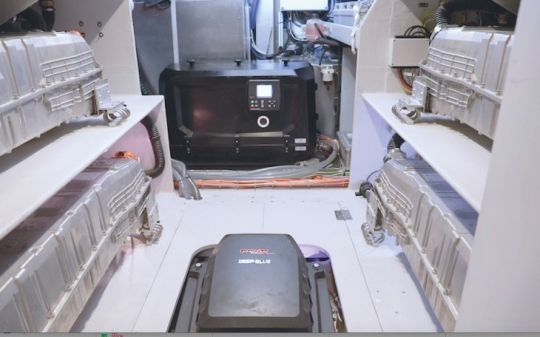
Electric propulsion offers silent, vibration-free sailing, while ensuring maximum efficiency at low speeds: an undeniable advantage for maneuvering in port or on long cruises. For safety reasons, Noos is equipped with an emergency diesel generator.
Filtered and recycled fresh water
When it comes to water management, Noos uses a rainwater recovery system. A ledge installed on the deckhouse channels rainwater to a three-stage filtration system (50 microns, 20 microns and carbon). This water is then UV-purified and stored in a 600-liter tank ready for use for domestic purposes.
An emergency desalination unit is also available to compensate for rainfall shortages. Grey water from showers and washbasins is recovered, filtered and reused for a variety of purposes on board, including supplying the toilets, watering plants grown on board, and even for the washing machine. This recycling minimizes freshwater consumption while maximizing its use for various on-board needs.
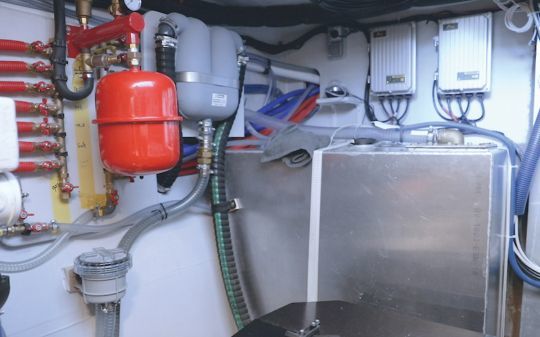
Management of all crop waste
In addition, Noos has a waste management system with a composter that treats black water and organic waste by filtering it through wood shavings. This process generates leachate, a nutrient-rich liquid that serves as fertilizer for the on-board crops. This fertilizer feeds the vegetables grown in the on-board farming areas, providing fresh produce for the crew all year round. Thanks to this approach, the trimaran closes the cycle of resources in a sustainable way, while maximizing the self-sufficiency of its occupants.
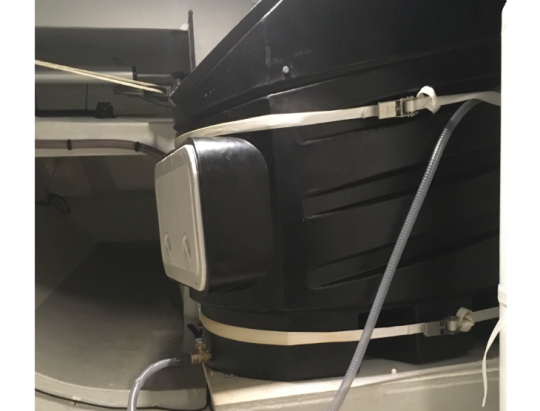
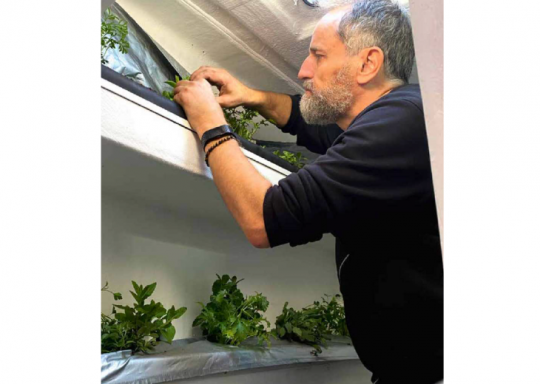
Performance optimized for the high seas
Thanks to its trimaran hull, the Neel 51 can reach high speeds while maintaining excellent stability. Its lightweight design and optimized lines reduce drag, enabling the boat to reach speeds in excess of 15 knots, even in light winds. Its low center of gravity and hydrodynamic appendages guarantee precise control of the boat, even in difficult weather conditions.
As a result, sailors maintain optimum control on the high seas while minimizing heel. The tiller is smooth and responsive, and the feedback given by the rudder is appreciated by experienced sailors. While sailing, Noos also uses the power of the water to generate electricity, thanks to an integrated hydrogenerator capable of producing up to 1 kW at a speed of 7 to 8 knots.
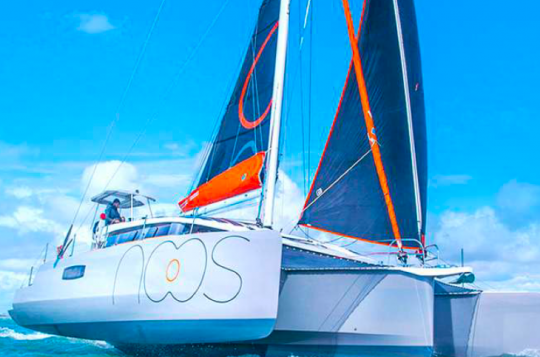
Wolf Boss, through its Permaboat program, is proving that a sustainable future at sea is not only achievable, but also attractive. By making sailing environmentally friendly without sacrificing comfort, as we'll see in the second part, Noos is paving the way for a new era of ocean cruising. A model that invites yachtsmen to rethink their relationship with the sea.

 /
/ 